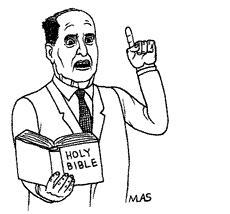Movies

The Apostle (October Films). Actor-director-writer Robert Duvall's film--about a Pentecostal preacher who beats his wife's lover into a coma--is deemed "the best movie ever about a man of God" (David Denby, New York). The film's strength is said to be its uncompromising psychological complexity: It shows the preacher as both very good and extremely evil, without lapsing into moral condemnation. Unlike most films about evangelicalism, it is not a condescending "put-down of redneck religion" (David Ansen, Newsweek). The most vigorous plaudits go to Duvall's performance; critics predict that it will revive his career from a slump and win him an Oscar nomination. (The movie is plugged here.)
Oscar and Lucinda (Fox Searchlight Pictures). Critics debate the merits of Australian director Gillian Armstrong (My Brilliant Career, Little Women): Is she "one of the best filmmakers of her time" (Kevin Thomas, the Los Angeles Times) or a filmmaker with promise who consistently disappoints? Many consider her adaptation of Peter Carey's Booker Prize-winning novel--about a romance between two eccentric gamblers, played by Ralph Fiennes and Cate Blanchett--to be disjointed. Others praise its depiction of 19th-century Australia, as well as Fiennes' performance. All agree that Armstrong is a stylist, producing images "suitable for framing" (Janet Maslin, the New York Times). (Clips are available here.)
The Boxer (Universal Pictures). Reviewers claim to be weary of Northern Ireland political dramas but admire this one anyway. High praise goes to Daniel Day-Lewis for his portrayal of a washed-up boxer and former IRA member just released from prison. "His most substantial role in years" (Dennis Lim, the Village Voice). Critics are relieved that the film uses politics only as a backdrop for a romance between Day-Lewis and a married woman (played by Emily Watson). Dissenters find the film rife with political caricature and clichés: "standard-issue IRA dramatics" (Kenneth Turan, the Los Angeles Times). (See the official site.)
Television
Seinfeld (NBC; Thursdays; 9 p.m. ET/PT). Critics laud Jerry Seinfeld's decision to retire his sitcom after this season, "leaving at the top of his game" (Albert Kim, Entertainment Weekly). They say the show's shtick--a comedy about self-involved people doing goofy things--had begun to wear thin. Appreciations deem the nine-season-old show the best of its era and a trenchant critique of late-20th-century social mores. "Television's first genuine comedy of manners since Leave It to Beaver," says Time's Bruce Handy. Prediction: Seinfeld's departure will end NBC's prime-time hegemony, with Fox filling the void. (NBC trumpets its prize show.)

Books
Truman Capote: In Which Various Friends, Enemies, Acquaintances, and Detractors Recall His Turbulent Career, by George Plimpton (Nan A. Talese/Doubleday). A gossipfest about the notorious novelist and gadabout. Most critics take the opportunity to sum up Capote's career: They recall with regret that Capote spent more time schmoozing than writing, and deem his work less memorable than his social appearances, particularly at his fabled 1966 "Black and White Ball" and on the Tonight Show. Critics also chide Plimpton for rehashing, rather than investigating, old accusations, such as Capote's alleged lying and drinking problems. The New York Times' Christopher Lehmann-Haupt calls the compilation "fluff," while the New York Review of Books' Elizabeth Hardwick thinks that its tone suits its subject.
Paradise, by Toni Morrison (Knopf). Reviews of Morrison's first post-Nobel novel, a Faulknerish tale of an all-black town in Oklahoma, are mixed. The New York Times Book Review's Brooke Allen says it is "[p]roof that Morrison continues to change and mature in surprising new directions." The NewYorker's Louis Menand calls Paradise "the strangest and most original book that Morrison has written," then criticizes it for its lack of cohesion, its failed forays into magical realism, and its willful allegorizing. In the New York Times, Michiko Kakutani calls it "a heavy-handed, schematic piece of writing, thoroughly lacking in the novelistic magic Ms. Morrison has wielded so effortlessly in the past." (Random House posts a page on the book.)
Music
"Northern Lights: The Music of Jean Sibelius" (Lincoln Center, New York City). A spate of recent performances of the Finnish composer's work--at Lincoln Center, Carnegie Hall, and the Brooklyn Philharmonic--sparks Sibelius (1865-1957) revisionism. The old conventional wisdom: Sibelius was a vulgar nationalist (à la Wagner) and a windy Romantic bore. Now, critics declare him a cerebral modernist who eschewed convention: He used "a nineteenth-century vocabulary but speaks with a twentieth-century voice" (Alex Ross, The New Yorker). The revisionists rate him one of the century's great composers.
Update
In a cover story in the Weekly Standard, Andrew Ferguson takes the field of evolutionary psychology to task by attacking its standard bearer, How the Mind Works author Steven Pinker. According to Ferguson, Pinker's seeming endorsement of infanticide in a recent New York Times Magazine article exposes the ethical failings of the wildly popular new branch of science. Ferguson, echoing a charge made by Washington Post columnist Michael Kelly, says that Pinker wants us "to see [infanticide] not as a moral horror but as a genetically encoded evolutionary adaptation, as unavoidable as depth perception or opposable thumbs." (Pinker has denied the accusation, arguing that he is trying to understand infanticidal behavior, not condoning it.)
Recent "Summary Judgment" columns
Winter Movie Roundup
"The Year in Review in Review"
Movie--Titanic;
Movie--Deconstructing Harry;
Movie--Scream 2;
Television--Ally McBeal (Fox);
Art--"Gianni Versace" (Metropolitan Museum of Art);
Architecture--Museum of Modern Art (New York City);
Book--Hogarth: A Life and a World, by Jenny Uglow.
Movie--Amistad;
Movie--Good Will Hunting;
Television--Breast Men (HBO);
Theater--The Diary of Anne Frank;
Opera--Amistad;
Book--A Certain Justice, by P.D. James.
--Franklin Foer
